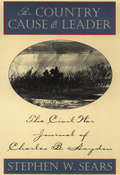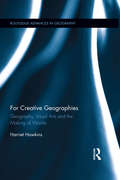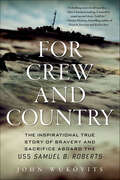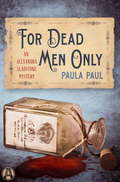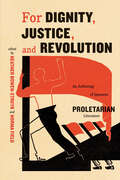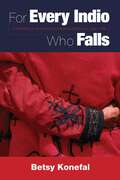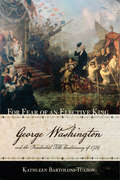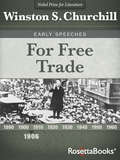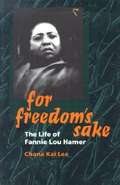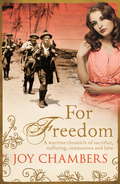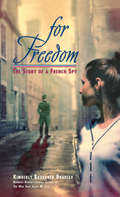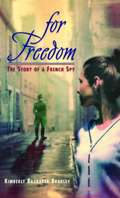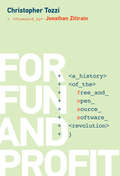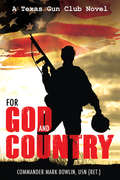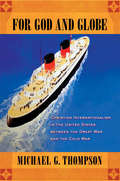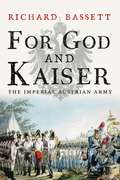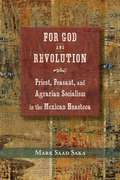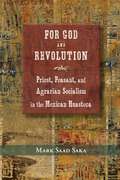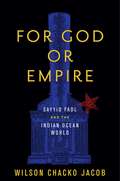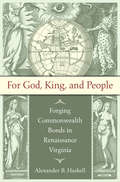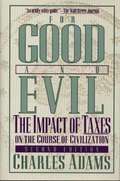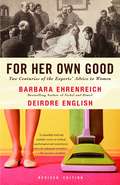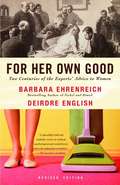- Table View
- List View
For Country, Cause & Leader: The Civil War Journal of Charles B. Haydon
by Stephen W. SearsNow published for the first time, an eyewitness account of the Civil War by a Union soldier who fought from Bull Run to Knoxville.This remarkable book presents the transcription of some twenty pocket diaries kept throughout the first three years of the Civil War by Charles B. Haydon and sent back one by one to his home in Decatur, Michigan, to be read by his father and brother. As readable as they are lively and informative, they offer a marvelous firsthand view of the war and constitute an important addition to our Civil War library.Haydon began as a third sergeant and ended as a lieutenant colonel. In the East he witnessed the rush to the colors, the first Bull Run, the building of the Army of the Potomac, the Peninsula campaign, and the fighting at second Bull Run and Fredericksburg. Early in 1863 his regiment was transferred to the western theater, where it served in Kentucky and under Grant at Vicksburg. Haydon was severely wounded in Mississippi. During the winter of 1863-64 he was in Tennessee and engaged in the campaigning around Knoxville. In March 1864—ironically, on his way home on furlough—Haydon contracted pneumonia and died.Charles Haydon had considerably more education than the average soldier, and his “engaging” journal reflects the fact (Publishers Weekly). A good half-dozen years older than most of his fellow recruits, he had studied for four years at the University of Michigan, read law, and was in practice when he volunteered. His journal, which was meant to be read, was a deliberate and conscientious attempt to record his experiences and thoughts of the war.
For Creative Geographies: Geography, Visual Arts and the Making of Worlds (Routledge Advances in Geography)
by Harriet HawkinsThis book provides the first sustained critical exploration, and celebration, of the relationship between Geography and the contemporary Visual Arts. With the growth of research in the Geohumanities and the Spatial Humanities, there is an imperative to extend and deepen considerations of the form and import of geography-art relations. Such reflections are increasingly important as geography-art intersections come to encompass not only relationships built through interpretation, but also those built through shared practices, wherein geographers work as and with artists, curators and other creative practitioners. For Creative Geographies features seven diverse case studies of artists’ works and exhibitions made towards the end of the twentieth and the beginning of the twentieth-first century. Organized into three analytic sections, the volume explores the role of art in the making of geographical knowledge; the growth of geographical perspectives as art world analytics; and shared explorations of the territory of the body, In doing so, Hawkins proposes an analytic framework for exploring questions of the geographical “work” art does, the value of geographical analytics in exploring the production and consumption of art, and the different forms of encounter that artworks develop, whether this be with their audiences, or their makers.
For Crew and Country: The Inspirational True Story of Bravery and Sacrifice Aboard the USS Samuel B. Roberts
by John WukovitsThe acclaimed WWII historian recounts the most dramatic naval battle of the Pacific War and the incredible sacrifice of the USS Samuel B. Roberts.On October 25, 1944, the Samuel B. Roberts, along with the other twelve vessels comprising its unit, stood between Japan’s largest battleship force ever sent to sea and MacArthur’s transports inside Leyte Gulf. Faced with the surprise appearance of more than twenty Japanese battleships, cruisers, and destroyers—including the infamous Yamato—the Samuel B. Roberts turned immediately into action with six other ships.Captain Copeland marked the occasion with one of the most poignant addresses ever given to men on the edge of battle: “Men,” he said over the intercom, “we are about to go into a fight against overwhelming odds from which survival cannot be expected.”The Samuel B. Roberts went down with guns blazing in a duel reminiscent of Davy Crockett’s Alamo defenders. The men who survived faced a horrifying three-day nightmare in the sea, where they battled a lack of food and water, scorching sun, numbing nighttime cold, and bloodthirsty sharks. In For Crew and Country, John Wukovitz vividly chronicles the Battle off Samar, one of history’s greatest clashes at sea.
For Dead Men Only
by Paula PaulHailed as "an intriguing mixture of mystery, romance, and history" by Lois Duncan, the Alexandra Gladstone series from award-winning author Paula Paul continues as an ominous horseman heralds the emergence of a secret society, hidden riches--and a string of chilling murders. The Temple of the Ninth Daughter sits on a hill at the edge of Newton-upon-Sea, an aura of mystery lingering over its tall, gray silhouette. Villagers whisper about the treasure housed inside, protected by local Freemasons who are bound by clandestine oaths. Dr. Alexandra Gladstone has no time for such nonsense. Between the patients in her surgery and the rounds she makes with her faithful dog, Zack, her days are busy enough. But Alexandra has no logical explanation when the Freemasons start dying, one by one, with no sign of foul play other than smears of blood on their Masonic aprons. And what to make of reports that a Knight Templar rides through the village before each passing? After the constable disappears in the midst of the crisis, Alexandra reaches out to her dashing, diligent friend, Nicholas Forsythe, Lord Dunsford, for assistance. Is someone after the treasure, or might a more sinister game be afoot? In order to solve this puzzle, Alexandra must somehow catch a killer who shows no remorse--and leaves no witnesses. Praise for Paula Paul's Alexandra Gladstone mysteries "I love the way real personalities from the past keep popping up to intermingle with Paul's fictional characters."--Lois Duncan, award-winning and bestselling author of Killing Mr. Griffin and I Know What You Did Last Summer "A lively mixture of ruling-class murder, Victorian morals, and love."--Bestselling author Tony Hillerman "I would recommend this to fans of the Maisie Dobbs series. There's a strong female character in a historical setting. She's determined, logical, intelligent and faces an unusual situation."--The Reader's Hollow
For Dignity, Justice, and Revolution: An Anthology of Japanese Proletarian Literature
by Norma Field Heather Bowen-StruykFiction created by and for the working class emerged worldwide in the early twentieth century as a response to rapid modernization, dramatic inequality, and imperial expansion. In Japan, literary youth, men and women, sought to turn their imaginations and craft to tackling the ensuing injustices, with results that captured both middle-class and worker-farmer readers. This anthology is a landmark introduction to Japanese proletarian literature from that period. Contextualized by introductory essays, forty expertly translated stories touch on topics like perilous factories, predatory bosses, ethnic discrimination, and the myriad indignities of poverty. Together, they show how even intensely personal issues form a pattern of oppression. Fostering labor consciousness as part of an international leftist arts movement, these writers, lovers of literature, were also challenging the institution of modern literature itself. This anthology demonstrates the vitality of the "red decade" long buried in modern Japanese literary history.
For Every Indio Who Falls: A History of Maya Activism in Guatemala, 1960-1990
by Betsy KonefalIn 1978, a Maya community queen stood on a stage to protest a massacre of indigenous campesinos at the hands of the Guatemalan state. She spoke graphically to the dead and to the living alike: Brothers of Panzós, your blood is in our throats!Given the context, her message might come as a surprise. A revolutionary insurgency in the late 1970s was being met by brutal state efforts to defeat it, efforts directed not only at the guerrilla armies but also at reform movements of all kinds. Yet the young woman was just one of many Mayas across the highlands voicing demands for change. Over the course of the 1970s, Mayas argued for economic, cultural, and political justice for the indigenous pueblo. Many became radicalized by state violence against Maya communities that soon reached the level of genocide.Scholars have disagreed about Maya participation in Guatemala's civil war, and the development of oppositional activism by Mayas during the war is poorly understood. Betsy Konefal explores this history in detail, examining the roots and diversity of Maya organizing and its place in the unfolding conflict. She traces debates about ethnicity, class, and revolution, and examines how (some) Mayas became involved in opposition to a repressive state. She looks closely at the development of connections between cultural events like queen pageants and more radical demands for change, and follows the uneasy relationships that developed between Maya revolutionaries and their Ladino counterparts. Konefal makes it clear that activist Mayas were not bystanders in the transformations that preceded and accompanied Guatemala's civil war--activism by Mayas helped shape the war, and the war shaped Maya activism.
For Fear of an Elective King: George Washington and the Presidential Title Controversy of 1789
by Kathleen Bartoloni-TuazonIn the spring of 1789, within weeks of the establishment of the new federal government based on the U.S. Constitution, the Senate and House of Representatives fell into dispute regarding how to address the president. Congress, the press, and individuals debated more than a dozen titles, many of which had royal associations and some of which were clearly monarchical. For Fear of an Elective King is Kathleen Bartoloni-Tuazon's rich account of the title controversy and its meanings. The short, intense legislative phase and the prolonged, equally intense public phase animated and shaped the new nation’s broadening political community. Rather than simply reflecting an obsession with etiquette, the question challenged Americans to find an acceptable balance between power and the people’s sovereignty while assuring the country’s place in the Atlantic world. Bartoloni-Tuazon argues that the resolution of the controversy in favor of the modest title of "President" established the importance of recognition of the people's views by the president and evidence of modesty in the presidency, an approach to leadership that fledged the presidency’s power by not flaunting it. How the country titled the president reflected the views of everyday people, as well as the recognition by social and political elites of the irony that authority rested with acquiescence to egalitarian principles. The controversy’s outcome affirmed the republican character of the country’s new president and government, even as the conflict was the opening volley in increasingly partisan struggles over executive power. As such, the dispute is as relevant today as in 1789.
For Free Trade (Winston S. Churchill Early Speeches)
by Winston S. ChurchillThis collection of speeches in support of free trade by the future Prime Minister tracks his early rise in British Parliament. Throughout his career—as both a Conservative and a Liberal—Winston Churchill was a strong supporter of free trade. As a Conservative, this position was sometimes controversial; early in his career, Churchill opposed Joseph Chamberlain's strategy of imposing tariffs to protect Britain&’s economic dominance. When he defected to the Liberal Party in 1904, Churchill continued to be a fierce free trade advocate. Originally published in 1906, For Free Trade was an influential political pamphlet that made Churchill&’s speeches on the subject available to the British people. This collection contains speeches delivered in Manchester or The House of Commons between 1902 and 1905.
For Freedom's Sake: The Life of Fannie Lou Hamer
by Chana Kai LeeA biography of Fannie Lou Hamer, one of the most important civil rights activists of the 20th century. It documents Hamer's lifelong crusade to empower the poor through collective action and the personal costs of her struggle to win a political voice and economic self-sufficiency for blacks in the segregated South.
For Freedom: A wartime saga of bravery, compassion and love
by Joy ChambersFor Freedom is a tangled and dramatic story of two couples in love and war, set in the Philippines during the World War II. The perfect read for fans of Margaret Leroy and Patricia Shaw. 'There's action and passion galore in Joy Chambers' For Freedom' - Australian Women's Weekly December 1941. The whole of South East Asia appears to be capitulating before the rising sun and four remarkable people are about to reassess their lives: Lexi Robinson: the doctor with a secret from the past who escapes before Hong Kong is invaded, only to find herself still within the enemy net. John Drayton Whitby: Australian army officer who focuses on the long, harrowing fight for freedom even whilst his mind clouds with suspicions about his wife. Hank 'Trap' Trapperton: the West Point-trained American 'spy' who is John Drayton's trusted friend and yet not really his friend at all. And Kathleen Leigh: the woman brought up to believe a lie until the day comes when she must confront the appalling truth.What people are saying about For Freedom:'A wonderful author and a wonderful book''Joy Chambers is up there with the very best authors and meticulously researches her book subjects''For Freedom is something else. It is informative, educational, entertaining and totally engrossing'
For Freedom: A wartime saga of bravery, compassion and love
by Joy ChambersFor Freedom is a tangled and dramatic story of two couples in love and war, set in the Philippines during the World War II. The perfect read for fans of Margaret Leroy and Patricia Shaw. 'There's action and passion galore in Joy Chambers' For Freedom' - Australian Women's Weekly December 1941. The whole of South East Asia appears to be capitulating before the rising sun and four remarkable people are about to reassess their lives: Lexi Robinson: the doctor with a secret from the past who escapes before Hong Kong is invaded, only to find herself still within the enemy net. John Drayton Whitby: Australian army officer who focuses on the long, harrowing fight for freedom even whilst his mind clouds with suspicions about his wife. Hank 'Trap' Trapperton: the West Point-trained American 'spy' who is John Drayton's trusted friend and yet not really his friend at all. And Kathleen Leigh: the woman brought up to believe a lie until the day comes when she must confront the appalling truth.What people are saying about For Freedom:'A wonderful author and a wonderful book''Joy Chambers is up there with the very best authors and meticulously researches her book subjects''For Freedom is something else. It is informative, educational, entertaining and totally engrossing'
For Freedom: The Story Of A French Spy
by Kimberly Brubaker BradleyA teenager transforms from a schoolgirl to a spy in this true story of heroism in wartime. Suzanne David's everyday life is suddenly shattered in 1940 when a bomb drops on the main square of her hometown, the city of Cherbourg, France, killing a pregnant neighbor right in front of her. Until then the war had seemed far away, not something that would touch her or her teenage friends. Now Suzanne's family is kicked out onto the street as German soldiers take over their house as a barracks. Suzanne clings to the one thing she really loves--singing. Her voice is so amazing that she is training to become an opera singer. As Suzanne travels around for rehearsals, cosume fittings, or lessons, she learns more about what the Nazis are doing and about the people who are "disappearing." Her travels are noticed by someone else, an organizer of the French Resistance. Soon Suzanne is a secret courier, a spy fighting for France and risking her own life for freedom.
For Freedom: The Story of a French Spy
by Kimberly Brubaker BradleyA teenager transforms from a schoolgirl to a spy in this true story of heroism in wartime. Suzanne David's everyday life is suddenly shattered in 1940 when a bomb drops on the main square of her hometown, the city of Cherbourg, France, killing a pregnant neighbor right in front of her. Until then the war had seemed far away, not something that would touch her or her teenage friends. Now Suzanne's family is kicked out onto the street as German soldiers take over their house as a barracks. Suzanne clings to the one thing she really loves--singing. Her voice is so amazing that she is training to become an opera singer. As Suzanne travels around for rehearsals, costume fittings, or lessons, she learns more about what the Nazis are doing and about the people who are "disappearing." Her travels are noticed by someone else, an organizer of the French Resistance. Soon Suzanne is a secret courier, a spy fighting for France and risking her own life for freedom.
For Fun and Profit: A History of the Free and Open Source Software Revolution (History of Computing)
by Christopher TozziThe free and open source software movement, from its origins in hacker culture, through the development of GNU and Linux, to its commercial use today.In the 1980s, there was a revolution with far-reaching consequences—a revolution to restore software freedom. In the early 1980s, after decades of making source code available with programs, most programmers ceased sharing code freely. A band of revolutionaries, self-described “hackers,” challenged this new norm by building operating systems with source code that could be freely shared. In For Fun and Profit, Christopher Tozzi offers an account of the free and open source software (FOSS) revolution, from its origins as an obscure, marginal effort by a small group of programmers to the widespread commercial use of open source software today. Tozzi explains FOSS's historical trajectory, shaped by eccentric personalities—including Richard Stallman and Linus Torvalds—and driven both by ideology and pragmatism, by fun and profit.Tozzi examines hacker culture and its influence on the Unix operating system, the reaction to Unix's commercialization, and the history of early Linux development. He describes the commercial boom that followed, when companies invested billions of dollars in products using FOSS operating systems; the subsequent tensions within the FOSS movement; and the battles with closed source software companies (especially Microsoft) that saw FOSS as a threat. Finally, Tozzi describes FOSS's current dominance in embedded computing, mobile devices, and the cloud, as well as its cultural and intellectual influence.
For God and Country: A Texas Gun Club Novel (The Texas Gun Club #3)
by Commander Mark BowlinIn WWII Italy, two soldiers have been granted a week of leave—but R&R is not in the cards for them…January 1944: The great Allied advance up the Italian peninsula has come to a halt before the formidable German Gustav Line at Monte Cassino. For the American soldiers in the valley, there is nothing to do but wait as General Mark Clark prepares his plan to shatter the German defenses and continue Fifth Army&’s march to Rome. Captain Perkin Berger and First Lieutenant Sam Taft are spared the monotony of waiting. They&’re given a week of well-deserved leave in an Adriatic resort town, where they have no responsibility other than relaxation. Proving the old maxim that no plan survives first contact with the enemy, Sam and Perk find themselves involved in the Canadian battle at Ortona, and once again they are thrust into the middle of a secret war between the Third Reich and the Vatican. When the cousins return from their R&R, it isn&’t long until the order is given. Against all sound military judgment, the exhausted and under-strength Gun Club is to cross the Rapido River and breach the Gustav Line—alone…
For God and Globe: Christian Internationalism in the United States between the Great War and the Cold War (The United States in the World)
by Michael G. ThompsonFor God and Globe recovers the history of an important yet largely forgotten intellectual movement in interwar America. Michael G. Thompson explores the way radical-left and ecumenical Protestant internationalists articulated new understandings of the ethics of international relations between the 1920s and the 1940s. Missionary leaders such as Sherwood Eddy and journalists such as Kirby Page, as well as realist theologians including Reinhold Niebuhr, developed new kinds of religious enterprises devoted to producing knowledge on international relations for public consumption. For God and Globe centers on the excavation of two such efforts—the leading left-wing Protestant interwar periodical, The World Tomorrow, and the landmark Oxford 1937 ecumenical world conference. Thompson charts the simultaneous peak and decline of the movement in John Foster Dulles's ambitious efforts to link Christian internationalism to the cause of international organization after World War II. Concerned with far more than foreign policy, Christian internationalists developed critiques of racism, imperialism, and nationalism in world affairs. They rejected exceptionalist frameworks and eschewed the dominant "Christian nation" imaginary as a lens through which to view U.S. foreign relations. In the intellectual history of religion and American foreign relations, Protestantism most commonly appears as an ideological ancillary to expansionism and nationalism. For God and Globe challenges this account by recovering a movement that held Christian universalism to be a check against nationalism rather than a boon to it.
For God and Kaiser
by Richard BassettAmong the finest examples of deeply researched and colorfully written military history, Richard Bassett's For God and Kaiser is a major account of the Habsburg army told for the first time in English. Bassett shows how the Imperial Austrian Army, time and again, was a decisive factor in the story of Europe, the balance of international power, and the defense of Christendom. Moreover it was the first pan-European army made up of different nationalities and faiths, counting among its soldiers not only Christians but also Muslims and Jews. Bassett tours some of the most important campaigns and battles in modern European military history, from the seventeenth century through World War I. He details technical and social developments that coincided with the army's story and provides fascinating portraits of the great military leaders as well as noteworthy figures of lesser renown. Departing from conventional assessments of the Habsburg army as ineffective, outdated, and repeatedly inadequate, the author argues that it was a uniquely cohesive and formidable fighting force, in many respects one of the glories of the old Europe.
For God and Revolution: Priest, Peasant, and Agrarian Socialism in the Mexican Huasteca
by Mark Saad SakaThis account traces the material and ideological roots of the rebellion to nineteenth-century liberal policies of land privatization and to the growth of a radical anarchocommunist agrarian consciousness. Elite landholders had held sway in the Mexican state of San Luis Potosí since colonial times. In the nineteenth century their seizures of agricultural lands clashed with the rising political consciousness of the Huastecos, who rose up to fight for their way of life. Saka further traces the roots of the Huasteco rebellion to the grassroots religiosity that had developed in the course of centuries of local clerical leadership as well as to a nationalism derived from Huastecan participation in Mexico's wars against the United States in the 1840s and France in the 1860s.
For God and Revolution: Priest, Peasant, and Agrarian Socialism in the Mexican Huasteca
by Mark Saad SakaDuring the early 1880s, a wave of peasant unrest swept the mountainous Huasteca region of northeastern Mexico. The rebels demanded political autonomy for their pueblos, protection for their churches, and restoration of the land, water, and foraging rights that were a part of their heritage—issues with nationwide implications that foreshadowed the revolution of 1910. This account traces the material and ideological roots of the rebellion to nineteenth-century liberal policies of land privatization and to the growth of a radical anarchocommunist agrarian consciousness.Elite landholders had held sway in the Mexican state of San Luis Potosí since colonial times. In the nineteenth century their seizures of agricultural lands clashed with the rising political consciousness of the Huastecos, who rose up to fight for their way of life. Saka further traces the roots of the Huasteco rebellion to the grassroots religiosity that had developed in the course of centuries of local clerical leadership as well as to a nationalism derived from Huastecan participation in Mexico&’s wars against the United States in the 1840s and France in the 1860s.
For God or Empire: Sayyid Fadl and the Indian Ocean World
by Wilson Chacko JacobSayyid Fadl, a descendant of the Prophet Muhammad, led a unique life—one that spanned much of the nineteenth century and connected India, Arabia, and the Ottoman Empire. For God or Empire tells his story, part biography and part global history, as his life and legacy afford a singular view on historical shifts of power and sovereignty, religion and politics. Wilson Chacko Jacob recasts the genealogy of modern sovereignty through the encounter between Islam and empire-states in the Indian Ocean world. Fadl's travels in worlds seen and unseen made for a life that was both unsettled and unsettling. And through his life at least two forms of sovereignty—God and empire—become apparent in intersecting global contexts of religion and modern state formation. While these changes are typically explained in terms of secularization of the state and the birth of rational modern man, the life and afterlives of Sayyid Fadl—which take us from eighteenth- and nineteenth-century Indian Ocean worlds to twenty-first century cyberspace—offer a more open-ended global history of sovereignty and a more capacious conception of life.
For God, King, and People: Forging Commonwealth Bonds in Renaissance Virginia (Published by the Omohundro Institute of Early American History and Culture and the University of North Carolina Press)
by Alexander B. HaskellBy recovering a largely forgotten English Renaissance mindset that regarded sovereignty and Providence as being fundamentally entwined, Alexander Haskell reconnects concepts historians had before treated as separate categories and argues that the first English planters in Virginia operated within a deeply providential age rather than an era of early modern entrepreneurialism. These men did not merely settle Virginia; they and their London-based sponsors saw this first successful English venture in America as an exercise in divinely inspired and approved commonwealth creation. When the realities of Virginia complicated this humanist ideal, growing disillusionment and contention marked debates over the colony. Rather than just "selling" colonization to the realm, proponents instead needed to overcome profound and recurring doubts about whether God wanted English rule to cross the Atlantic and the process by which it was to happen. By contextualizing these debates within a late Renaissance phase in England, Haskell links increasing religious skepticism to the rise of decidedly secular conceptions of state power. Haskell offers a radical revision of accepted narratives of early modern state formation, locating it as an outcome, rather than as an antecedent, of colonial endeavor.
For Good and Evil: The Impact of Taxes on the Course of Civilization (2nd edition)
by Charles AdamsThe very word "taxes" sends shivers up spines. Yet very few realize the tremendous impact that taxation has had on civilization. Charles Adams changes that in this newly revised and enlarged edition of his fascinating history. Taxation, says Adams, has been a catalyst of history, a powerful influence on and sometimes the direct cause of many of the famous events that have marched across the world's stage as empires collided and battled for the right to tax the loser. For Good and Evil is the first book to examine how taxation has been a key factor in world events. Like the Rosetta Stone--itself a tax document--the book sheds fresh light onto much of history. Did you know that biblical Israel split after Solomon's death because his son refused to cut taxes? That Rome rose to greatness because of a liberal tax regime but declined under corrupt and inefficient ones? That in Britain Lady Godiva made her famous ride as a tax protest? That in Switzerland William Tell was made to shoot the apple off his son's head as punishment for tax resistance? Or that Fort Sumter, where the first shots of the Civil War were fired, was a Customs House? Combining facts with thought-provoking comment Adams frequently draws parallels between tax events of the past and those of the present. Finding fault with the way Western civilization is taxed, he provides ideas for curing those faults by using the valuable lessons that history has taught. The special value of this refreshing look at history lies in the lessons to be drawn by all taxpayers: "Taxes are the fuel that makes civilization run, but how we tax and spend determines to a large extent whether we are prosperous or poor, free or enslaved, and most importantly, good or evil." Once you read For Good and Evil, you'll never feel the same about taxes.
For Her Love
by Paula Reed"Life is like that, Grace. Sometimes you sail with nothing to trust but the stars ... It all works out if you plot your course carefully." Giles Courtney may be the captain of his own ship, but he's not yet certain he's the master of his destiny. His reckless privateering days behind him, Giles is determined to make a respectable name for himself, yet where to begin is the question at hand--especially when he must inform his first patron that his convictions forbid him to traffic in slaves. But while wealthy sugar planter Edmund Welbourne is astounded by Giles' refusal, his beautiful daughter Grace is quite obviously intrigued--and Giles is instantly attracted. As intelligent and spirited as she is lovely, Grace is everything Giles wants in a wife--but their hasty marriage soon proves to be a challenge that will test everything both of them believe about the nature of freedom and the overwhelming power of love Paula Reed was a full-time English teacher at Columbine High School of Littleton, Colorado. After surviving the tragic shootings there, she, like many students and teachers who were there that day, decided to reinvent her life by pursuing her true passion--writing romance novels--while continuing to teach. Ms. Reed lives in the Denver area. Visit her Web site: www.paula-reed.com.
For Her Own Good: Two Centuries of the Experts Advice to Women
by Barbara Ehrenreich Deirdre EnglishA provocative new perspective on female history, the history of American medicine and psychology, and the history of child-rearing unlike any other.
For Her Own Good: Two Centuries of the Experts' Advice to Women
by Barbara Ehrenreich Deirdre EnglishA provocative new perspective on female history, the history of American medicine and psychology, and the history of child-rearing unlike any other.
